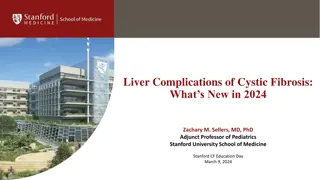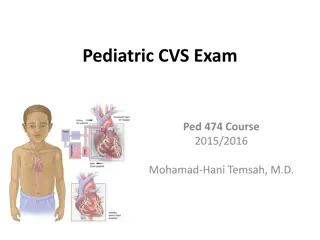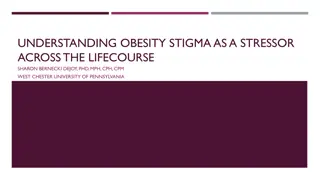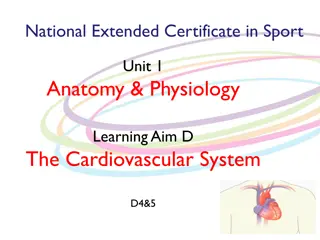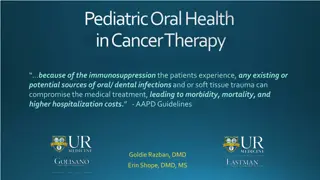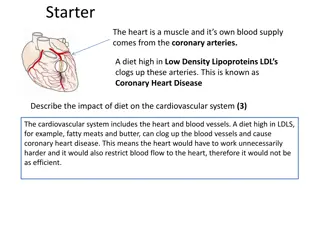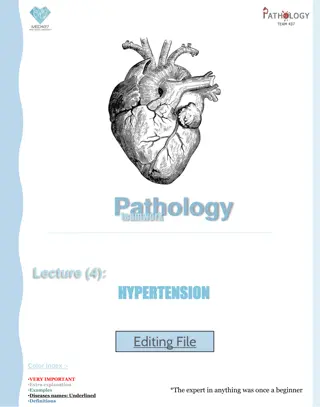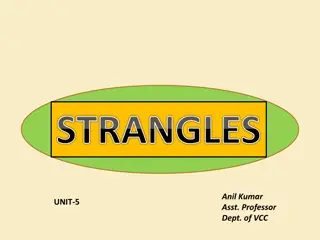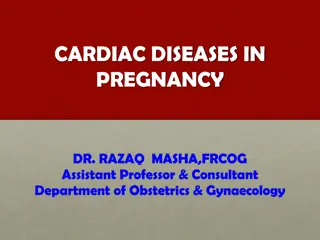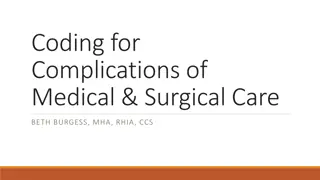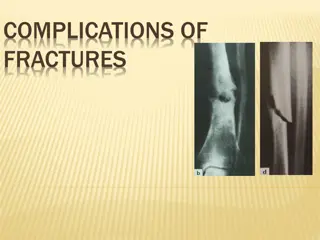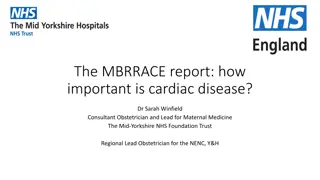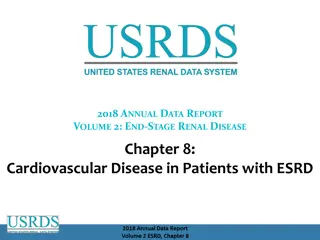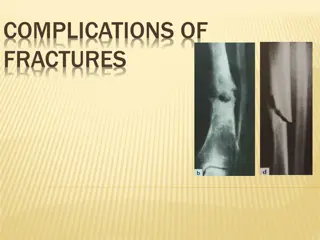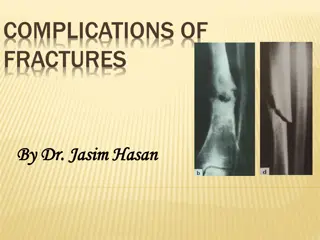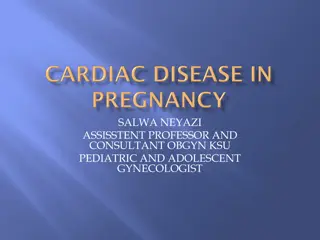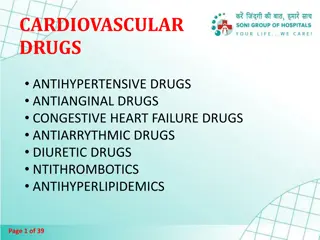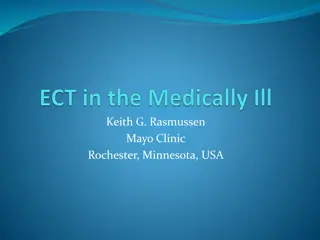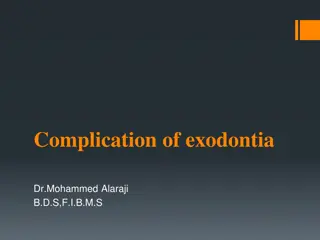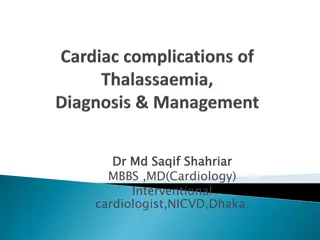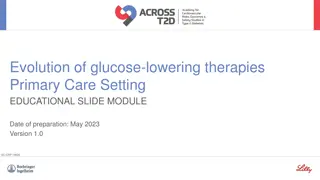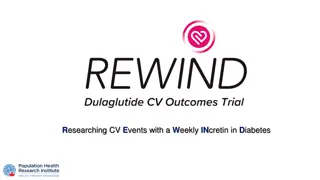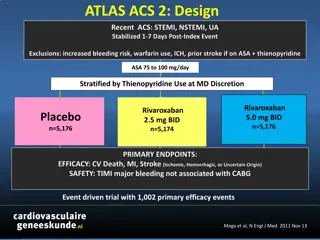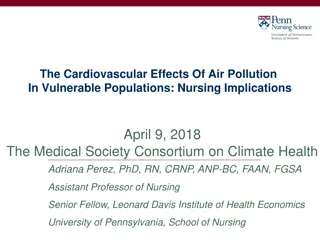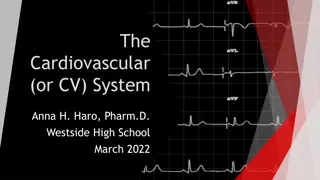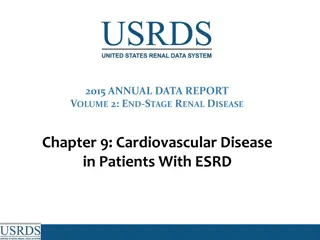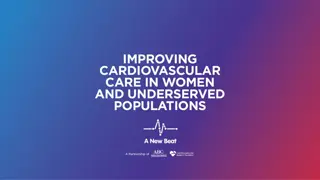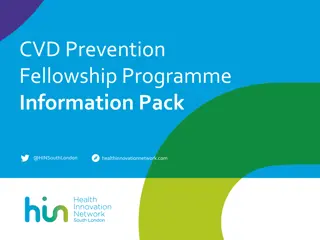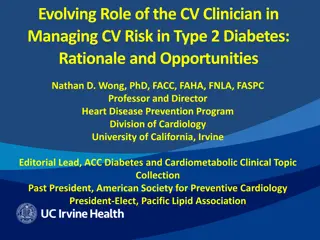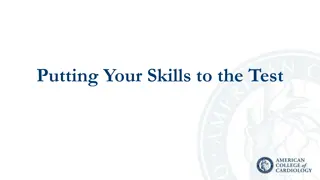Inflammation and Cholesterol Predicting Cardiovascular Events
This study explores how inflammation and cholesterol levels predict cardiovascular events among 13,970 statin-intolerant patients in the CLEAR Outcomes trial. Findings suggest residual inflammatory risk may be a stronger predictor than residual cholesterol risk for future events. The research analyz
0 views • 17 slides
Hyperparathyroidism
Hyperparathyroidism is characterized by overactive parathyroid glands leading to excessive secretion of parathyroid hormone and elevated blood calcium levels. This condition can cause symptoms like excessive urination, abdominal pain, weakness, and more. Primary hyperparathyroidism is often due to n
0 views • 20 slides
Understanding Liver Complications in Cystic Fibrosis: Latest Insights for 2024
Liver complications in cystic fibrosis (CF) have gained importance due to CFTR modulators impacting liver health. This presentation by Dr. Zachary M. Sellers delves into new definitions for CF liver disease, CFF recommendations for screening, management, and treatment of hepatobiliary issues in CF.
0 views • 17 slides
Insights from the REPRIEVE Trial for Managing Cardiovascular Risk in Patients with HIV
Cardiovascular disease is a growing concern in individuals living with HIV, despite advancements in treatment. The REPRIEVE Trial sheds light on the importance of assessing cardiovascular risk and implementing primary prevention measures in this population. Dr. Grinspoon's financial disclosures and
0 views • 35 slides
The REPRIEVE Trial: Developing Cardiovascular Disease Prevention Strategy for People Living with HIV
The REPRIEVE trial focuses on developing a cardiovascular disease prevention strategy for individuals living with HIV. It addresses the increased risk of CVD in this population, even with good viral suppression. The study evaluates the use of pitavastatin, a statin with anti-inflammatory properties,
1 views • 33 slides
Pediatric Cardiovascular Exam Overview
Explore the differences between pediatric and adult cardiovascular exams, highlighting key differences in disease patterns, examination approaches, and objectives. Learn about the importance of distinguishing between routine well-baby exams and evaluations of ill children, along with step-by-step gu
6 views • 24 slides
CLEAR Outcomes Trial: Bempedoic Acid for Cardiovascular Prevention
The CLEAR Outcomes Trial investigated the effects of bempedoic acid, an ATP citrate lyase inhibitor, on cardiovascular outcomes in primary prevention patients. Results showed a reduction in cardiovascular events with bempedoic acid, particularly in patients intolerant to statins. Baseline characteri
1 views • 13 slides
Maternal and Fetal Complications of Obesity in Pregnancy
Understanding the impact of obesity stigma as a stressor throughout the lifecourse is essential, especially concerning pregnancy. The prevalence of pre-pregnancy overweight and obesity poses significant risks, leading to various maternal complications like gestational diabetes, cesarean delivery, an
0 views • 62 slides
Effects of Exercise on the Cardiovascular System
Exploring the immediate and long-term effects of exercise on the cardiovascular system reveals the remarkable adaptations and responses the body undergoes. From short-term increases in heart rate and blood pressure to long-lasting changes in cardiac output, exercise plays a crucial role in enhancing
0 views • 13 slides
Pediatric Oral Health in Cancer Therapy: Strategies and Complications
Pediatric patients undergoing cancer therapy face increased risks of oral health complications due to immunosuppression, including oral infections and tissue trauma. These can compromise treatment effectiveness, leading to higher morbidity, mortality, and healthcare costs. Strategies for assessing a
0 views • 12 slides
Impact of Diet on Cardiovascular Health
The impact of diet on the cardiovascular system is significant, with a high intake of LDL leading to clogged arteries and increased risk of Coronary Heart Disease. Regular exercise brings about positive changes in the cardiovascular system, enhancing heart function and oxygen delivery. Immediate ben
0 views • 7 slides
Understanding Hypertension: Causes, Classification, and Complications
Hypertension, a common yet serious health issue, is explored in detail in this lecture. The etiology, risk factors, and complications of hypertension are discussed, along with the classification into primary, secondary, benign, and malignant hypertension. The lecture also covers causes of secondary
1 views • 13 slides
Understanding Strangles in Horses: Symptoms, Treatment, and Complications
Strangles, also known as Equine Distemper, is an infectious disease affecting horses and equids. It is characterized by upper respiratory tract infection, lymph node abscesses, and various complications. Symptoms include nasal discharge, coughing, and swelling of lymph nodes. Prompt diagnosis and tr
3 views • 11 slides
Cardiac Diseases in Pregnancy: Implications and Management
Normal pregnancy induces significant physiologic changes in the cardiovascular system, which can impact women with pre-existing cardiac diseases. Understanding the New York Heart Association classification scheme is crucial for assessing symptomatology during pregnancy. Rheumatic Heart Disease, part
0 views • 12 slides
Guidelines for Coding Complications of Medical & Surgical Care
Proper documentation and coding of complications of medical and surgical care are essential for accurate classification and billing. Assigning codes based on the provider's documentation of the relationship between the condition and care is crucial. Complications must be clearly documented with a ca
1 views • 55 slides
Complications of Fractures: Types and Consequences
Fractures can lead to a variety of complications, both locally and generally. General complications include shock, embolisms, crush syndrome, and more. Local complications can involve visceral, vascular, nerve injuries, compartment syndrome, infections, and more. Late complications may result in del
0 views • 29 slides
Understanding Hyperemesis Gravidarum: Symptoms, Complications, and Management
Hyperemesis gravidarum is a severe condition in pregnancy characterized by intractable nausea and vomiting, resulting in fluid and electrolyte imbalances, nutritional disturbances, and physical and psychological debilitation. The exact cause is unknown, but factors like hormonal changes, genetics, a
0 views • 22 slides
Morphologic and Physiologic Connections in Blood Pressure Waveforms for Cardiovascular Event Prediction
This report discusses the morphologic and physiologic connections in continuous blood pressure waveforms and their association with incident cardiovascular events. The study aims to assess if changes in arterial elasticity contribute to predicting CVD events and explores additional measures derived
0 views • 30 slides
The Importance of Addressing Cardiovascular Disease in Maternal Health
Cardiovascular disease remains a significant contributor to maternal mortality in the UK, with maternal deaths from cardiac issues outnumbering those from other direct causes, except thrombosis. The prevalence of cardiovascular risk factors in pregnant women, combined with a lack of consideration fo
0 views • 22 slides
Prevalence of Cardiovascular Disease in Adult ESRD Patients: 2016 Data Report
The data report examines the prevalence of cardiovascular diseases in adult End-Stage Renal Disease (ESRD) patients in 2016 by treatment modality and age. It includes information on various cardiovascular conditions such as atrial fibrillation, acute myocardial infarction, coronary artery disease, a
2 views • 25 slides
Complications of Fractures: Types and Risks
Complications of fractures can be classified as general, local early, and late complications. General complications include shock, embolisms, and fever while local complications involve injuries to nearby tissues and infections. Early local complications can lead to visceral, vascular, nerve injurie
0 views • 29 slides
Complications of Fractures and Their Management by Dr. Jasim Hasan
This detailed presentation by Dr. Jasim Hasan covers the complications of fractures, including general and local complications, early and late complications, and specific issues such as shock, vascular injuries, nerve damage, and more. The information highlights the importance of recognizing and add
0 views • 29 slides
Understanding Cardiovascular Changes in Pregnancy
This informative content discusses the normal physiological changes of the cardiovascular system in pregnancy, symptoms and signs of cardiovascular disease, the impact of pregnancy on cardiovascular health, and the management of cardiovascular issues during pregnancy, labor, and the postpartum perio
0 views • 28 slides
Complications One Year After Mid-Urethral Slings in Sweden
This study aims to provide a quantitative analysis of patient-reported complications one year after mid-urethral slings in Sweden. The GynOp register covers all Swedish surgeries with a high coverage and patient response rate. The study, led by Stefan Zacharias and Eva Uustal, looks into complicatio
0 views • 17 slides
Understanding Cardiovascular Drugs: An Overview of Treatment Options
Explore the world of cardiovascular drugs, including antihypertensive, antianginal, heart failure, antiarrhythmic, diuretic, antithrombotic, and antihyperlipidemic medications. Dive into the mechanisms of action, clinical indications, and adverse effects of these drugs, gaining valuable insights int
0 views • 39 slides
Comprehensive Overview of Medical Risks and Strategies in ECT
In this detailed presentation, various aspects of medical risks associated with Electroconvulsive Therapy (ECT) are discussed, along with strategies to mitigate complications. Topics covered include the physiological effects of ECT on the cardiovascular, neurological, and endocrine systems, as well
0 views • 27 slides
Common Complications of Exodontia in Dental Practice
Undesirable situations can arise during dental exodontia, including perioperative and postoperative complications. Perioperative complications may include crown fractures, soft tissue injuries, and failure to obtain anesthesia, while postoperative complications can involve trismus, hematoma, and wou
0 views • 48 slides
Understanding Women's Health: Risks, Prevention, and Care
Women's health encompasses the screening, diagnosis, and management of diseases and conditions affecting physical and emotional well-being. Services are provided by a diverse team of healthcare professionals specializing in obstetrics, gynecology, surgery, and primary care. Cardiovascular disease is
0 views • 46 slides
Understanding Cardiovascular Complications of Thalassaemia
Cardiovascular complications of thalassaemia can be categorized into iron overload-related issues such as myocyte failure and arrhythmias, and non-iron overload complications including pulmonary hypertension and atrial fibrillation. Cardiac iron accumulation poses a significant risk, leading to card
0 views • 36 slides
Evolution of Glucose-Lowering Therapies in Primary Care Settings
Cardiovascular effects of older glucose-lowering therapies and the history of cardiovascular outcome trials are discussed in this educational slide module. It outlines the timeline of treatment options from the discovery of insulin to the introduction of various medications. Evidence regarding the c
0 views • 29 slides
Investigating the Impact of Weekly Incretin on Cardiovascular Events in Diabetes
Individuals with type 2 diabetes have an increased risk of cardiovascular events compared to those without the condition. Research indicates that certain GLP-1 receptor agonists have shown promising results in reducing cardiovascular events in diabetic patients with specific HbA1c levels. However, t
0 views • 69 slides
Clinical Trial Results of Rivaroxaban in ACS Patients: ATLAS-ACS 2 Study
The ATLAS-ACS 2 study investigated the efficacy and safety of rivaroxaban in ACS patients post-index event. The primary endpoints included cardiovascular death, MI, and stroke, with significant reductions seen with rivaroxaban compared to placebo. Stent thrombosis was also reduced with rivaroxaban t
0 views • 10 slides
GripTrack: Innovative Device for Monitoring Elderly Health
GripTrack is a portable grip strength monitoring device designed to track cardiovascular and musculoskeletal health in the elderly population. It aims to provide an accurate early warning system by assessing grip strength, which can indicate cognitive decline, cardiovascular health, and frailty synd
0 views • 14 slides
Understanding the Cardiovascular Effects of Air Pollution in Vulnerable Populations
This presentation discusses the significant cardiovascular effects of air pollution, particularly on vulnerable populations such as older adults, women, and Latinos. It highlights the environmental factors contributing to cardiovascular health disparities and emphasizes the nursing implications for
0 views • 13 slides
Understanding the Cardiovascular System: Anatomy, Physiology, and Function
Explore the intricate workings of the cardiovascular system, encompassing the heart, blood vessels, and blood circulation. Learn the anatomy, physiology, and function of this vital system, including the roles of arteries, veins, capillaries, and red and blue blood. Understand how the cardiovascular
0 views • 23 slides
Cardiovascular Disease in End-Stage Renal Disease Patients: Data Analysis 2011-2013
Understanding the prevalence and causes of cardiovascular diseases in patients with End-Stage Renal Disease (ESRD) is crucial for effective management. This report analyzes data from 2011-2013, focusing on the causes of death in ESRD patients, prevalence of cardiovascular diseases by treatment modal
0 views • 18 slides
Insights on Cardiometabolic Risk Reduction and Diabetes Treatment in 2019
Cardiologists in 2019 must address the significant cardiovascular risks associated with diabetes mellitus. Dr. Keith C. Ferdinand highlights the increased rates of heart disease, stroke, and heart failure in patients with diabetes. Despite advancements, cardiovascular risk management remains subopti
0 views • 10 slides
Cardiovascular Disease Prevention Fellowship Programme Information Pack
The Cardiovascular Disease Prevention Fellowship Programme by Health Innovation Network offers a comprehensive 7-month program for healthcare professionals to enhance their skills in cardiovascular disease prevention. The program includes clinical webinars, improvement collaborative sessions, and qu
0 views • 14 slides
The Evolving Role of Cardiovascular Clinicians in Managing Type 2 Diabetes Risk
The role of cardiovascular clinicians in managing cardiovascular risk in patients with type 2 diabetes is evolving, with a growing emphasis on collaboration with multidisciplinary teams. Recognizing the potential benefits of certain diabetes medications on cardiovascular outcomes, clinicians are urg
0 views • 25 slides
Understanding PCSK9 Inhibitors for Cardiovascular Health
PCSK9 inhibitors are a novel class of medications that help lower LDL cholesterol levels, reducing the risk of cardiovascular events. This article covers their mechanism of action, patient groups benefiting from them, efficacy in LDL-C lowering, and safety considerations. Learn how PCSK9 inhibitors
0 views • 8 slides


